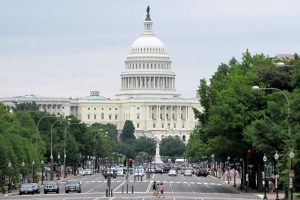Another ‘Trafficking’ Bill Which Could Impact Adult Heads To The Senate
 WASHINGTON – With the ink of President Trump’s signature still drying on the “Allow States and Victims to Fight Online Sex Trafficking Act” (FOSTA), the U.S. Senate seems poised to pass another new bill ostensibly aimed at curbing human trafficking, but which could have implications for sex workers, and potentially for adult performers and website operators, as well.
WASHINGTON – With the ink of President Trump’s signature still drying on the “Allow States and Victims to Fight Online Sex Trafficking Act” (FOSTA), the U.S. Senate seems poised to pass another new bill ostensibly aimed at curbing human trafficking, but which could have implications for sex workers, and potentially for adult performers and website operators, as well.
The “End Banking for Human Traffickers Act of 2018” (EBHTA), which has already sailed through the House of Representatives by a vote of 408-2, appears to have broad bipartisan support in the Senate, as well. The bill is being championed in the Senate by a strange pair of bedfellows indeed – Senators Marco Rubio (R-Fla.) and Elizabeth Warren (D-Mass.).
“Human trafficking is one of the most urgent human rights issues of our time,” Rubio said in a joint statement issued earlier this month by the two senators. “This bill helps provide financial institutions and law enforcement with additional support in their ongoing efforts to help stop human trafficking and hold perpetrators accountable. I am pleased that the House passed it and I look forward to working with my colleagues in the Senate to ensure this bill becomes law.”
“We need to use every tool available to fight human trafficking,” Warren added. “I am glad the House passed our legislation to help financial institutions and regulators cut off traffickers’ access to the banking system and fight perpetrators profiting off the lives of human beings. I look forward to working with my Senate colleagues to pass this bipartisan bill.”
While Rubio and Warren’s statements suggest the legislation offers new tools to financial institutions to deny access to the American banking system, the text of the bill largely calls for review of current procedures and suggestions from relevant stakeholders as to how such procedures and regulations can be improved.
“Not later than 180 days after the date of the enactment of this Act,” the bill states, “the Financial Institutions Examination Council, in consultation with the Secretary of the Treasury, the private sector, and appropriate law enforcement agencies, shall… review and enhance training and examinations procedures to improve the capabilities of anti-money laundering and countering the financing of terrorism programs to detect financial transactions relating to severe forms of trafficking in persons; review and enhance procedures for referring potential cases relating to severe forms of trafficking in persons to the appropriate law enforcement agency; and determine, as appropriate, whether requirements for financial institutions are sufficient to detect and deter money laundering relating to severe forms of trafficking in persons.”
Several of the key terms and phrases in EBHTA, including “severe forms of trafficking in persons,” take their definitions from section 103 of the Trafficking Victims Protection Act of 2000 (TVPA).
Under the relevant section of the TVPA, the term “severe forms of trafficking in persons” is defined as “sex trafficking in which a commercial sex act is induced by force, fraud, or coercion, or in which the person induced to perform such act has not attained 18 years of age; or the recruitment, harboring, transportation, provision, or obtaining of a person for labor or services, through the use of force, fraud, or coercion for the purpose of subjection to involuntary servitude, peonage, debt bondage, or slavery.”
The same section of the TVPA defines “sex trafficking” as “the recruitment, harboring, transportation, provision, obtaining, patronizing, or soliciting of a person for the purpose of a commercial sex act.”
Read narrowly, the provisions of the new bill, coupled with the statutory definitions to which they refer, might seem unlikely to be used in targeting the bank accounts of adult companies and individual sex workers. Some observers are concerned, however, that the financial institutions themselves may interpret their responsibilities under the law more broadly, and with greater aversion to potential risk, than the drafters of the law anticipate or intend.
“There is a concern that banks will substantially increase their anti-money laundering compliance policies relating to anything having to do with sex work, since trafficking has been conflated with sex work to a significant degree in recent political and legislative discussions,” attorney Larry Walters told YNOT. “This could result in decreased access to banking services by not only sex workers, but adult website operators as well. Banks tend to be conservative, and avoid risk at all cost.”
One Comment
Leave a Reply
You must be logged in to post a comment.














Pingback: Another ‘Trafficking’ Bill Which Could Impact Adult Heads To The Senate (YNOT) - Free Speech Coalition